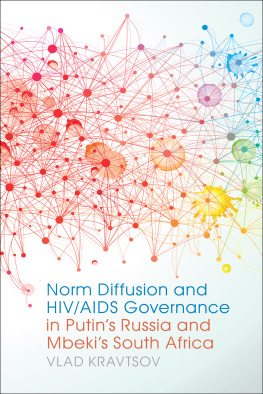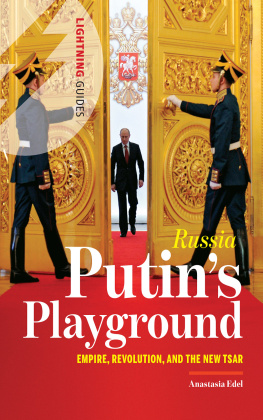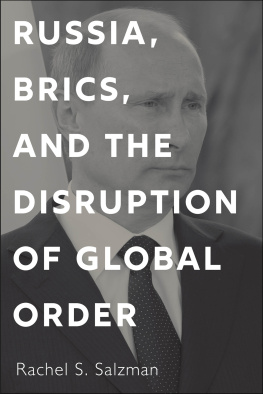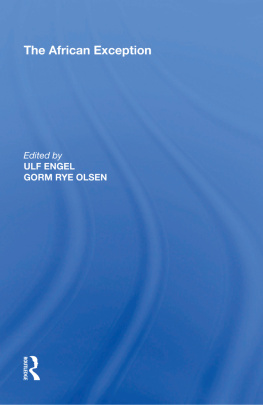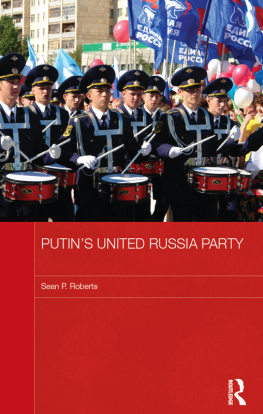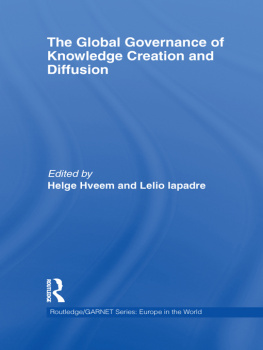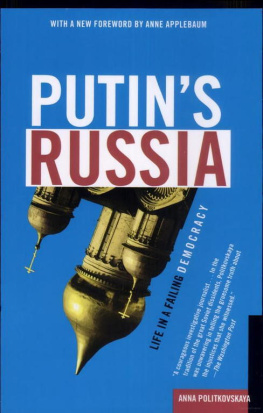NORM DIFFUSION AND HIV / AIDS GOVERNANCE IN PUTINS RUSSIA AND MBEKIS SOUTH AFRICA
SERIES EDITORS
William W. Keller
Professor of International Affairs, Center for International Trade and Security, University of Georgia
Scott A. Jones
Director of Export Control Programs, Center for International Trade and Security, University of Georgia
SERIES ADVISORY BOARD
Pauline H. Baker
The Fund for Peace
Eliot Cohen
Paul H. Nitze School of Advanced International Studies, Johns Hopkins University
Eric Einhorn
Center for Public Policy and Administration, University of Massachusetts, Amherst
John J. Hamre
The Center for Strategic and International Studies
Josef Joffe
Hoover Institution, Institute for International Studies, Stanford University
Lawrence J. Korb
Center for American Progress
William J. Long
Sam Nunn School of International Affairs, Georgia Institute of Technology
Jessica Tuchman Mathews
Carnegie Endowment for International Peace
Scott D. Sagan
Center for International Security and Cooperation, Stanford University
Lawrence Scheinman
Monterey Institute of International Studies, CNS-WDC
David Shambaugh
The Elliott School of International Affairs, George Washington University
Jessica Stern
FXB Center, Harvard School of Public Health
Norm Diffusion and HIV / AIDS Governance in Putins Russia and Mbekis South Africa
Vlad Kravtsov
2015 by the University of Georgia Press
Athens, Georgia 30602
www.ugapress.org
All rights reserved
Set in 10/14 Minion Pro by Graphic Composition, Inc., Bogart, Georgia
Printed and bound by Sheridan Books
The paper in this book meets the guidelines for
permanence and durability of the Committee on
Production Guidelines for Book Longevity of the
Council on Library Resources.
Most University of Georgia Press titles are
available from popular e-book vendors.
Printed in the United States of America
19 18 17 16 15 C 5 4 3 2 1
Library of Congress Cataloging-in-Publication Data
Kravtsov, Vlad, author.
Norm diffusion and HIV / AIDS governance in Putins Russia and Mbekis South Africa / Vlad Kravtsov.
p. ; cm. (Studies in security and international affairs)
Includes bibliographical references and index.
ISBN 978-0-8203-4799-8 (hardcover : alk. paper) ISBN 978-0-8203-4833-9 (e-book)
I. Title. II. Series: Studies in security and international affairs.
[DNLM: 1. Acquired Immunodeficiency SyndromeRussia (Federation) 2. Acquired Immunodeficiency SyndromeSouth Africa. 3. HIV InfectionsRussia (Federation) 4. HIV InfectionsSouth Africa. 5. Health PolicyRussia (Federation) 6. Health PolicySouth Africa. 7. Health Services Accessibilityorganization & administrationRussia (Federation) 8. Health Services Accessibilityorganization & administrationSouth Africa. wc 503]
RA643.86.r8
362.196979200947dc23
2014038948
British Library Cataloging-in-Publication Data available
CONTENTS
PREFACE
The porosity of current political borders does not always promote normative congruence across political spaces. Paradoxically, in the age of increased global connectivity, domestic anxieties over normative intrusions from abroad do not disappear. On the contrary, all too many politicians sense that norm diffusion threatens the ideas and sensibilities on which these politicians authority is premised. They try to push back against external influences and defend the methods of governance they are comfortable with. This book analyzes two interesting instances of these anxieties and explores their consequences for norm diffusion and for the performance of domestic governance systems. I reach deep into the constructivist toolshed to develop an adequate analytic framework and use HIV / AIDS as an issue area to investigate systems of governance empirically.
This book is the result of a long journey, both academic and personal. I wish to express my immense gratitude for the unwavering support and friendship of my mentors Audie Klotz, Brian Taylor, and Roger Coate. I am very grateful for the advice, comments, questions, suggestions, reminders, corrections, and criticisms given by Hongying Wang, Mark Rupert, Michael Bosia, Andrew London, Linda Cook, Oxana Shavel, Tim Shaw, and Elena Dmitrieva. I thank Chris Jones, Marion Orr, and Dmitry Gorenbug for the opportunity to test some of my ideas in front of graduate students at Northern Illinois University, during a speaker series at Brown University, and during a post-Communism seminar at Harvard University, respectively. Matt Hoffman, Mark Miller, Marian Palley, and Dan Green were helpful for sustaining my early interest in the topic in particular and in political science in general. Without Jim Rosenau and Roger Coate my intellectual journey would not have even started. My friends and colleaguesAsli Ilgit, Deepa Prakash, Eric Rittenger, Chan Woong Shin, Jooyoun Lee, and Matt Waltonwherever your careers bring you, thank you for stimulating me to push my inquiry further. Without Irina Chechels and Aleksandr Shatilovs insights, my understanding of current Russia would have been incomplete. All of you challenged me intellectually. Here is my ninety-thousand-word response to that challenge. I also greatly benefited from the thoroughgoing analysis of my text by two anonymous reviewers.
I thank Julia Ruman for the support and distraction she has been offering so generously.
A necessary note is on transliteration of Russian names into the Latin script. I chose to use the United States Board on Geographic Names and the Permanent Committee on Geographical Names for British Official Use (BGN / PCGN 1947 System). This system provides a simple way for romanization of the Russian alphabet. It has no special letters to represent distinct Russian sounds; it is intuitive to read and pronounce. I follow this system thoroughly, although I also use simplified transliterations of Russian names and surnames when doing so is conventionally accepted. All translations are mine unless indicated otherwise.
ABBREVIATIONS
AIDS | acquired immunodeficiency syndrome |
ANC | African National Congress |
ARVS | antiretrovirals |
ATM | African traditional medicines |
AZT | azidothymidine (zidovudine) |
COSATU | Congress of South African Trade Unions |
DST | Department of Science and Technology (South Africa) |
FSKN | Federal Drug Control Service of the Russian Federation |
GAK | State Antinarcotics Committee |
GAP | Global AIDS Programme (WHO) |
GBC | Global Business Coalition on HIV/AIDS, Tuberculosis and Malaria |

